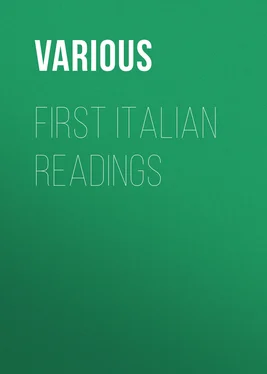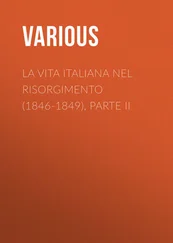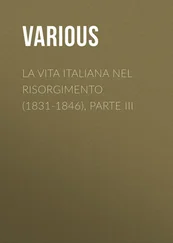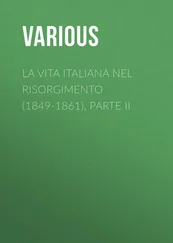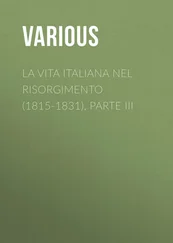faceva egli a dire, he went on to say .
faceva finta… inteso, pretended not to notice them .
non siete stato, you have not been .
pigliasse, subjunctive used after Sebbene.
col fare il morto, by playing dead .
Eccoti.Pronouns are joined to the interjection ecco, just as to a verb; tiintimates the interest of the hearer in what is going on.
dal Re(French chez le roi ), to the king's palace . Da has a variety of meanings in the following selections, such as from , by , for , to or at the house of , suited to , as .
entrato che fu, as soon as he had entered .
gran, for grande .
Di' al tuo, Say to your . The forms of the second person singular are used in addressing inferiors; also in speaking to children, intimate friends, and near relatives.
della caccia del suo padrone, of his master's killing .
doveva recarsi, was to go .
avrebbe potuto, perfect of the conditional used where the simple tense would be expected.
con quanta… gola, with all his might .
corressero, subjunctive used after verb of commanding.
faceva spiccare… persona, set off his good looks .
fini fini, repetition for emphasis; occurs frequently in Italian in case of adjectives or adverbs.
fosse, subjunctive used in indirect question; in l. 2 of next page, used after a superlative.
sarebbe parso, it would have seemed ; parere conjugated with essere .
per dirne una, for example .
dal vedersi… leone, at seeing a lion before his eyes .
Di lì a poco, After a little .
come sarebbe a dire, in other words .
Vostra maestà sia la benvenuta, Welcome to your majesty .
di, than .
dovevano; compare note 15.
da non potersi dire, beyond words .
del suo, as her own .
Culincenereand Cenerentolaare both from cenere, ashes ; the former with a depreciative prefix.
che tornassero… viso, which might the best become them .
ci sarebbe proprio da ridere, it would be a fit subject for laughter .
tutt'intera la santa giornata, the whole blessed day .
più lontano che potè, as far as she could .
che cosa avesse, what was the matter with her .
Vorrei, I should like .
non sapendo… miglia, not having the faintest idea .
che, introduces the question.
che non entrava… contentezza, beside herself with joy .
per quanto vecchio, old as he was .
per farla ballare, that is, as his partner in the dance .
nè punto nè poco, at all .
In quella che, While .
non capiva… gioja; compare note 11.
Dev'esser, She must be .
Dio mio! Dear me! — altrein the next clause simply adds emphasis.
di lì a pochi giorni; compare I., note 25.
non, expletive, not to be translated.
per farsi vedere, in order to show off , make a show .
di discorso in discorso, from one thing to another .
un fracasso d'inferno, a deafening clatter .
Solferino e San Martino, villages of Lombardy, in northern part of Italy. The battle in question occurred on June 24.
Saluzzo, town of Piedmont, in northwestern part of Italy.— andava; note force of tense: was moving .
Bella cosa! That's a small matter!
Saran, They must be . Future used to express probability.
L'hanno proprio con me! They are really after me!
dubiti, vuole, third person instead of second in addressing a superior; also the usual form in polite conversation.
ad un punto, at the same time .
pigliare, with passive sense, to be taken away .
stato percorso, that had been passed over .
dalla.Notice the recurrence of da on this page and the next, and compare I., note 10.
in due non ci si sta, there isn't room for two under it .
Nemmen per sogno, Not at all, By no means .
d'averla passata liscia, to have got off so easily .
colle buone, with fair words .
a più non posso, with all their might .
Читать дальше
